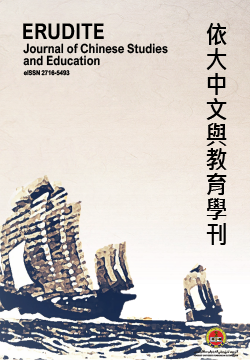传统与现在的拉锯: 网络小说《后宫如懿传》中的女性形象与女性意识
Confrontation Between Tradition and Modernity:The Female Image and Female Consciousness in the Internet Novel Ruyi's Royal Love in the Palace
DOI:
https://doi.org/10.37134/erudite.vol3.2.5.2022Keywords:
网络小说, 《后宫如懿传》, 女性意识, 女性形象, 再现Abstract
近年来,宫廷题材备受大众喜爱,尤其是女性角色受到高度重视,不只可窥探读者的兴趣取向,更能集中探讨小说家的创作意图,究竟女性形象的形塑以及其笔下女性意识的朗现,究竟「再現」了什么?这个再现是否具有现实基础或条件的支持?例如《后宫·如懿传》原创小说,便深受读者喜欢,小说建构的是一个封建专制的男权社会,后宫女性作为“服侍皇帝,繁衍子嗣”的工具而存在,她们在两性关系里处于极端被动的状态。然而,小说家却能同时形塑贴近时下的女性人物,赋予传统女性具有意识转变的可能性,透露了女性觉醒的可能性并试图让大众看到小说中的女性人物成长蜕变的过程,从传统女性的牢笼里走出,成为新时代的女性。例如小说中的如懿和海兰在前期时期都一直处于被动的立场。无论他人如何陷害她们,她们都选择隐忍及退让。但是后宫嫔妃并没有因她们的隐忍而收手,反而变本加厉的欺压她们。最后,促使如懿和海兰在这勾心斗角中结盟了,她们以自己的智慧来反击这些人,甚至让自己重新获得皇帝的恩宠,巩固了自己在后宫的地位。在后期的小说中,如懿勇敢的对皇帝说出自己渴望一夫一妻的关系,指责皇帝的错误导致两人最后不欢而散,如懿也因此决然选择以断发与皇帝划清界限,至死都不向皇帝退让,并坚守着当初与皇帝美好的誓言死去。从以上的例子,便能看到如懿从一开始天真的守护着与皇帝的爱情,到后来皇帝对其种种的误会从而促使她自主意识的觉醒。因此,本文主要以网络小说——《后宫如懿传》为分析文本,希望能透过小说文本的女性角色,深入探讨究竟是什么样的女性特质的再现,颠覆了古时候人们对“女性特质”所设定好的标准,并进一步说明网络小说的创作如何再现现代女性的特质。
In recent years, court themes have been loved by the public, especially female characters. This can not only glimpse the reader's interest orientation, but also glimpse the novelist's creative intentions, what is the reproduction of female image shaping and the female consciousness? Does this reproduction have the support of a realistic basis or condition? For example, the original novel Ruyi’s Royal Love in the Palace is very popular among readers. The novel constructs a feudal autocratic patriarchal society, women of the harem exist as tools for ‘serving the emperor and prospering the children’ and they are in an extremely passive state in a relationship between the sexes. However, with the change of the times, the status of women has gradually improved, and many classic female figures have followed the growth rules from simple to complex, from obscurantism to awakening. For example, Ru Yi always had great expectations of the emperor in the early period, and no matter how hurtful the emperor said, she firmly believed that the emperor loved her. It was not until the later period when various contradictions between Ru Yi and the emperor appeared, such as the emperor listened to imperial astronomer say that Ru Yi killed their son, mistakenly thought that Ru Yi had an affair with his bodyguard Ling Yun Che etc, then she realized that the emperor had changed become suspicious and selfish. At the end of the story, Ruyi chooses to cut a line with the emperor by cutting his hair, and sticks to the good oath he took with the emperor to die. From the above examples, we can see that Ruyi innocently guarded her love with the emperor from the beginning, to the emperor’s various misunderstandings about her later, which prompted her to awaken her sense of autonomy. Therefore, this article mainly uses the online novel Ruyi’s Royal Love in the Palace as an analytical text, hoping to analyze what kind of female characteristics are through the female characters in the novel text, subverting the standards set by people in ancient times for “femininity”, and further explaining how the creation of online novels reproduces the characteristics of modern women.
Keywords: Internet novels, Ruyi’s Royal Love in the Palace, Feminine consciousness, Female image, Reproduce
Downloads
References
一、论著
丁钢:《历史与现实之间:中国教育传统的理论探索》(2009),桂林:广西师范大学出版社。
流潋紫:《如懿传》(2017),中国华侨出版社。
西蒙娜德波伏娃:《第二性》(1998),陶铁本译,北京:中国书籍出版社。
李小江:《女性审美意识探微》(1989)郑州: 河南人民出版社。
约翰·布洛克曼《未来英雄》(1998)海口:海南出版社。
苏珊·鲍尔多:《不能承受之重——女性主义、西方文化与身体》(2009),南京:江苏人民出版社。
路易斯·麦克尼福柯著,[中]贾湜译:《对福柯思想体系中身体的再解读》(1999),哈尔滨:黑龙江人民出版社。
二、期刊论文
羊艳:《解读女性宫廷剧的大众文化意义》(2011),《电影文学》,第21期。
刘杰:<平衡下的成功,女性主义的进步——《延禧攻略》《如懿传》的对比分析>(2019),《视听解读》。
杨景萍:《探析如何分析人物形象》(2014),《龙源期刊》,第3期。
金鑫:《试论我国女性纪录片中的女性意识》(2017),人民网:<今传媒>,第2期。
梁文蓁、陈宜宜:《 台湾近十年教育领导硕博论文的分析:女性主义的观点》(2000),《妇女与两性学刊》,第11期。
Downloads
Published
Issue
Section
License
Copyright (c) 2022 Connie Chee Ming Wong

This work is licensed under a Creative Commons Attribution-NonCommercial-ShareAlike 4.0 International License.





